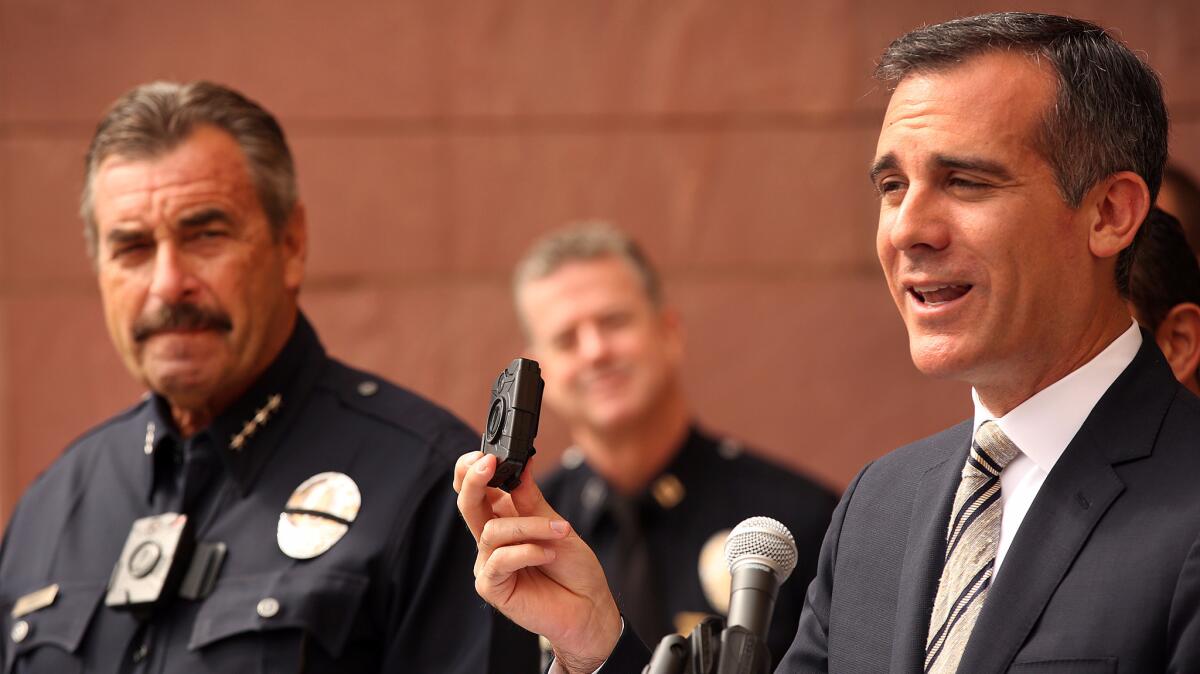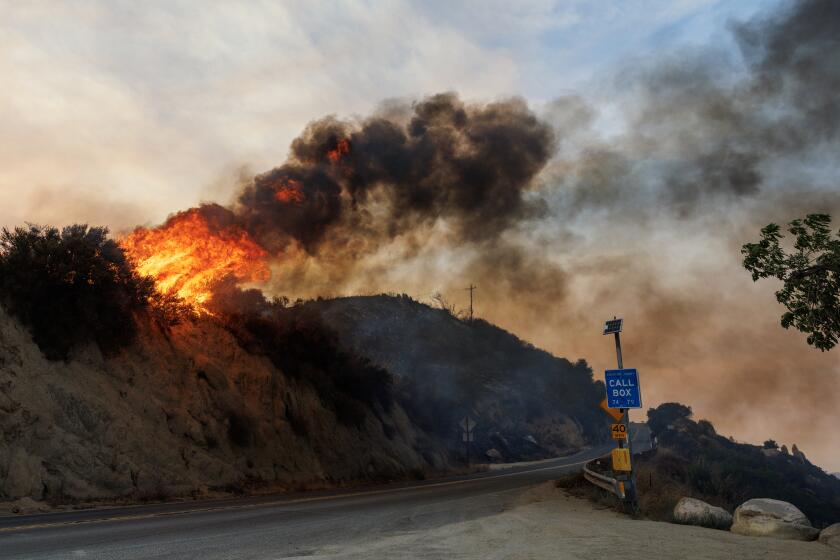City Council vote resumes $57.6-million rollout of LAPD body cameras

The Los Angeles City Council gave its final approval Wednesday to a five-year, $57.6-million plan to buy thousands of police body cameras, clearing the way for the LAPD to resume rolling out the devices after a six-month delay.
The LAPD is poised to become the largest law enforcement agency in the country to use the cameras on a widespread scale, with plans to distribute 7,000 devices among officers.
Wednesday’s decision capped a sometimes-rocky review process for the LAPD’s body camera initiative, which was backed by Mayor Eric Garcetti and his appointees on the Police Commission. The rollout came to a standstill in recent months amid lingering concerns from city lawmakers.
Garcetti said in a statement Wednesday that the vote marked a “historic moment for the LAPD.”
Police Commissioner Steve Soboroff, who spearheaded efforts to bring body cameras to the LAPD, echoed the mayor’s comments, calling Wednesday a “really good day” not only for the LAPD, but for other agencies that he said would look to the Los Angeles Police Department when creating their own body camera programs.
“The sooner we would have gotten the cameras the better,” Soboroff said. But, he said, council members in recent months “asked really good questions to which there were really good answers.”
Last year, city lawmakers began voicing dismay over the program’s cost — $57.6 million over five years — and raised questions about whether the Police Department got the best deal possible. Competing technology firms complained they were unfairly left out of the LAPD selection process, which relied in part on a competitive search conducted by the much smaller Kern County Sheriff’s Department.
As a result, city lawmakers postponed a crucial vote to approve the body camera program, delaying the rollout for months and derailing Garcetti’s pledge to put a camera on nearly every officer by the end of this year.
LAPD officials do not expect to finish outfitting 7,000 officers with cameras until late 2017, at the earliest.
Body cameras have been hailed as a key tool for improving police accountability and building community trust in law enforcement. Garcetti unveiled his initiative in late 2014 amid nationwide protests over how police use force, particularly against African Americans.
Critics of the LAPD’s plans have been less enthusiastic, saying the department’s policy for the cameras will undermine efforts to improve police oversight. The American Civil Liberties Union of Southern California, for example, has opposed the program for months, criticizing the LAPD’s decision not to publicly release body camera footage without a court order.
Catherine Wagner, an attorney for the ACLU, said Wednesday that the LAPD’s policies for how the cameras will be used represent a “backward step for public trust.” She said her organization would evaluate its next steps as it continues to monitor the program’s implementation.
“If people think these body cameras will improve police accountability, transparency and public trust, they are sadly mistaken,” she said. “This is money down the drain.”
The LAPD already has about 860 cameras, purchased with private donations. Last year, the department negotiated a contract with Taser International to provide thousands more, along with replacement equipment, digital storage of the recordings and 4,400 Tasers.
The council was set to vote on the $31.2-million contract in December. But city lawmakers balked at the last minute, saying they were worried that the technology would require scores of police officers to review camera footage and monitor the use of the devices. The LAPD later revised its plan to include more civilian staffers.
The concerns continued in April, when Councilman Mitch Englander questioned whether the LAPD should start the selection process over and accept new bids from camera manufacturers. Police commissioners defended the process, saying the initiative was too important to delay further.
Englander, who heads the council’s Public Safety Committee, asked for a fresh analysis of the body camera market. LAPD officials then surveyed several camera companies to determine whether they had made upgrades to their devices or storage systems, but decided Taser still was their preferred choice.
ALSO
Prosecutor calls for mandatory prison for sexual assaults like Brock Turner’s
26 million trees have died in the Sierra since October, raising fire risk
Property owner asks Verity Baptist Church to leave after pastor praises Orlando massacre
UPDATES:
1:27 p.m.: This article was updated with additional comments from the ACLU.
This article was originally published at 12:09 p.m.
More to Read
Sign up for Essential California
The most important California stories and recommendations in your inbox every morning.
You may occasionally receive promotional content from the Los Angeles Times.












